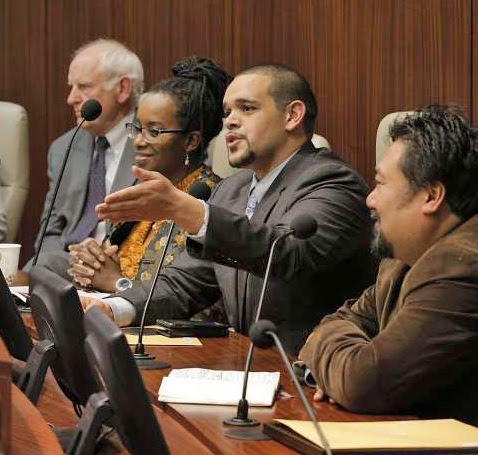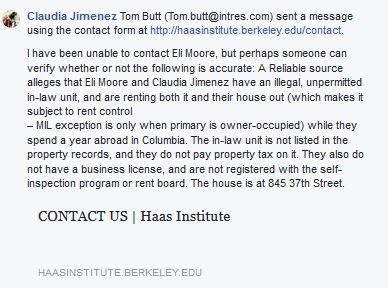Councilmember Eduardo Martinez Responds to False Report by Police Department
From Eduardo:
"Mark Gagan is an outstanding example of a community minded police officer. I have always known him to be hard working, open to the whole community and fair. I so much respected his work, I had suggested that he be considered as chief when the position was open. I also believe that Chief Brown is doing an excellent job under very trying budgetary
circumstances.
I have no information about the charges brought against Mark or his involvement in my case but from my experience with him, and until I have contrary information, I would think he may be the victim of internal police department politics."
Melvin Willis to Run for Mayor!

On December 15, Richmond Councilmember Melvin Willis announced that he is running for mayor of the City of Richmond in the November 2018 election. The announcement was made at the Richmond Progressive Alliance (RPA) holiday party, to a joyful crowd of supporters.
“Many people have contributed to Richmond’s transformation in recent years, and we are thankful to all. At the same time, many challenges remain, and a much better Richmond is possible!” said Willis.
Melvin Willis, a community organizer with Alliance of Californians for Community Empowerment (ACCE), made history in 2016 when at 26 he became the youngest councilmember ever elected in the City’s history. He received the highest number of votes in the race, and his success was crowned by the passage in Richmond of the first Fair Rent Control and Just Cause for Eviction law in California in 30 years, a ballot initiative at the center of his campaign.
At the announcement, Willis was flanked by Vice-Mayor Jovanka Beckles and Councilmember Ada Recinos. In addition to Beckles and Recinos, Councilmembers Ben Choi, Eduardo Martinez and two-term former Mayor Gayle McLaughlin have all endorsed Willis’ candidacy.
“Melvin has the values, the vision and the commitment to lead Richmond to a higher level of progress and to make it a better city for all our residents. He thinks globally and organizes and mobilizes locally. He is thoughtful, caring, gentle and generous. People know him and love him. Melvin is the best of Richmond,” said former Mayor Gayle McLaughlin.
During his announcement Willis stressed that the important achievements that have transformed Richmond over the past decade and are inspiring many other communities throughout the nation need to be defended against undermining measures at higher levels of government.
“As Mayor I will lead all those in Richmond willing to work to make our city better. Together we will sustain our accomplishments and keep folks in their homes, fight pollution, defend immigrants’ rights, improve our schools and libraries, and continue our progress in reducing violent crime. I will promote a community participatory process for the city budget. I will respond to the needs of our youth, I will focus on the creation of affordable housing, and my doors will always be open to every resident of our community to hear their thoughts and ideas,” Willis added.
Willis affirmed that his campaign for Mayor will be based on peoplepower and neighborpower, and free of corporate donations. He rejects the corrupting influence of corporate money and invites all residents to support a one-person, one-vote true democratic election.
Rising to the Occasion
“Nearly all men can stand adversity, but if you want to test a man’s character give him power.” --Abraham Lincoln
For those of you who read Mayor Tom Butt’s e-forum, you no doubt have noticed how bitter he has become towards the Richmond Progressive Alliance.
His latest tactics – leaking private emails, sharing peoples’ home addresses, contacting their employers – are as low-down dirty as any corporate-funded political attack ad we’ve seen in this city … and we’ve seen plenty. To have it come from a sitting mayor is unseemly at best (can you ever imagine Gayle McLaughlin ever doing this?), and an abuse of power at worst. (How many private citizens have to worry about their Mayor spending hours digging up dirt on them and publicizing it?)
And to have it come from Mayor Butt, who has generally been above these kinds of smear tactics and decried them in the past, is just plain disappointing. The night after the 2016 elections, when we were all reeling from a vicious and degrading political season, the RPA and RPA-endorsed electeds released a statement saying,
At times, the members of the Council will surely disagree with each other about the best ways to solve Richmond’s many challenges. Our city will be well-served when decisions are debated with rigor, passion, and civility. Given the extreme challenges from the outcome of the presidential election, our national government may be wracked by division and malice, but in Richmond, let our Council demonstrate how dissent and decency can co-exist.
To Mayor Butt particularly:
We look forward to working with Mayor Tom Butt and Councilmember Jael Myrick in a spirit of constructive collaboration. There is common ground in many areas and it is land worth cultivating. Let us all bring our best selves to the table and rise to this occasion.
The statement was written in hopes that political discourse in Richmond could show that “dissent and decency can co-exist.” But Mayor Butt’s malice towards the RPA isn’t coming from radically different policy views (e.g. both Butt and the RPA agree about the importance of ensuring affordable housing, but disagree on the strategies), but rather a threat to his power. Butt is the most entrenched part of Richmond’s political establishment. He’s held power for 22 years, and doesn’t intend to let go in 2018. Now he is faced with young, diverse and dynamic new leaders.
A group of leaders who are rooted in the movements for clean energy and the rights of low income and working folks. Who are not backed by corporate money but hundreds of volunteers who believe in them and their vision. Who represent the future and all our hopes and dreams for it.
Many of us are inspired by this future and joyfully moved to action. Others are threatened and lash out.
ACLU Considering Taking on Tom Butt
In case you missed it, a recent Richmond Confidential article covered Tom Butt’s recent attack on Eli Moore and Claudia Jimenez, two RPA members; and the ACLU’s plans to consider getting involved
Emails between the mayor and residents, obtained by Richmond Confidential, indicate that many in the community were alarmed when the mayor used his regular “e-forum” to doxx political adversaries, sharing their home addresses and accusing them of violating Richmond’s rent control ordinance.
Butt rejects claims that he overstepped his bounds and has steadfastly defended his actions. But the drama could move outside City Hall, as the American Civil Liberties Union of Northern California is reportedly looking into the controversy.
It all began earlier this fall, when Richmond Confidential quoted resident Eli Moore in an October 3 article about a new ferry service coming to the city. Butt, a major proponent of the ferry, took issue with Moore’s assessment that, while the ferry will greatly improve access to San Francisco, many residents will not benefit equally from the service.
A day after the story’s publication, in his weekly email dispatch known as the “Tom Butt E-Forum,” the mayor responded to the article by accusing Moore of “embracing the dark side.”
To read on, click here
Social Equity in the Marijuana Economy
Do a google search for “equity” and “marijuana” and you are likely come up with numerous hits for private equity investing opportunities, and other ways Wall Street can cash into this newly legalized market.
But progressives have another type of equity in mind: social equity. How can we ensure that what will likely be a booming business benefits local people and economies, particularly communities who have been disproportionately hurt by the “war on drugs”?
Many cities in California are looking to Oakland for its innovative cannabis Equity Permit Program. Informed by recommendations from the Department of Race and Equity, during the first phase of cannabis permitting, half of Oakland’s permits will be reserved for residents who were convicted on marijuana-related charges before 1997. Residents with mean incomes under 80 percent who have lived for 10 years in select parts of East Oakland, West Oakland, and Fruitvale – areas with high concentrations of marijuana arrests – also qualify under the program. Finally, entrepreneurs who incubate equity applicants through providing free rent (for example), can also get priority. After the city collects $3.4 million in business taxes from the cannabis sector, the City will start a second permitting phase in which it will offer assistance such as no-interest loans to equity applicants.
In Richmond, city staff will be seeking Council direction on drafting regulations for recreational cannabis businesses. Richmond currently allows unlimited medical cannabis cultivation and manufacturing, but only a limited number of dispensaries. The regulations are quite extensive, with all cannabis businesses taxed at 5 percent, and will continue next year for both medical and other uses.
In the past two months, the Richmond Planning Commission approved medical cannabis cultivation conditional use permits at two locations. One, on the site of the old Tradeway Carpet building and complex on Carlson Blvd, will house five separate grow operations. The Pullman Neighborhood Council (under Naomi William's leadership) asked for additional conditions for the safety and beautification of the neighborhood, and the Planning Commission included them all in the Conditional Use Permit. The main addition is a requirement of each operator to pay $5,000 per year ($25,000 total) into a fund that they will administer and disburse based on recommendations of the neighborhood council.
Council Invites Richmond to join Richmond
 On Tuesday the Richmond City Council voted to invite North Richmond to join Richmond. The official process is called “annexation” but the Council made it clear that Richmond would only proceed with the annexation process if there was first an information campaign and then some clear indication that North Richmond residents want it -- a victory for self-determination!
On Tuesday the Richmond City Council voted to invite North Richmond to join Richmond. The official process is called “annexation” but the Council made it clear that Richmond would only proceed with the annexation process if there was first an information campaign and then some clear indication that North Richmond residents want it -- a victory for self-determination!
Most everyone agrees that the existence of North Richmond, an unincorporated area governed by the County but entirely surrounded by Richmond, is the result of racist practices backed up by the power of a few property owners some years ago.
Joining Richmond presumably would have a number of benefits for residents, including policing by the Richmond Police Department instead of the County Sheriff, better public services, rent control and a voice in the Richmond government. But not all North Richmond residents agree, and property owners will pay higher taxes. It was important to RPA members that the decision on whether or not to annex be made those living in North Richmond.
The Mayor had proposed that the City Council vote to initiate the state mandated process for annexation (often called the LAFCO process) and then see if there was sufficient objection from residents to stop it. The RPA Steering Committee and others argued that self-determination for the North Richmond residents was primary, and that the first step had to be finding some way of gauging what North Richmond residents want.
On Tuesday, the Council passed a resolution directing staff to draw up plans for an initial information distribution and a survey/vote that will attempt to reach all residents of North Richmond, not just voters, and in appropriate languages. Going to North Richmond residents first was the important point of contention-- a process vigorously opposed by the Mayor and his close supporters in social media in the days prior to the Council meeting.
Two RPA Council members wanted to initiate the survey now, but not start the first steps LAFCO until after we had results from the survey. Supervisor John Gioia then assured them that even if those two things happened concurrently, the annexation process would not proceed past those initial steps. The Council would still wait to for the results to come in before moving further along with the process. Since there was no important difference between those positions, the Council agreed to do the survey/vote while beginning LAFCO.
The RPA commends the City Council and Supervisor GIoia for putting their heads together and coming up with a great plan.
RPA Position on North Richmond Annexation - LET RESIDENTS DECIDE!
MOTION, that the RPA Steering Committee recommends that the Richmond City Council pass a resolution expressing that:
- Recognizing that North Richmond was excluded from Richmond due to racist housing policies of the past, the City of Richmond is willing to annex unincorporated North Richmond, if that's what North Richmond residents want to do.
- The City will initiate a process whereby North Richmond residents are asked if they want to be annexed.
- Under all circumstances, the will of North Richmond residents must be determined by a vote. The City of Richmond should not initiate the annexation process with LAFCO unless and until North Richmond votes in favor of it.
- Prior to the vote, mailings and town hall meetings must be used to inform North Richmond residents, including non-voters, on all aspects of annexation and get their feedback.
To Annex or Not to Annex? That is the Question for North Richmond to Decide
The RPA is currently discussing the question about annexation of North Richmond, which was brought to the City Council on 9/26/17. As an RPA member who has participated in many community activities in North Richmond over the past 15 years, I offer here some thoughts on this issue.
The Richmond city council should express its willingness in principle to annex unincorporated North Richmond, but only IF that's what the residents want.
The LAFCO (Local Agency Formation Commission) annexation process can be initiated either by a petition of the unincorporated North Richmond voters, or by the City of Richmond. If the residents themselves initiation the process, the City should cooperate with them and not stand in the way.
Since a City initiated process with LAFCO would not guarantee a vote of the residents, the City should not initiate this process at this time. It should first work with the County (which currently governs unincorporated North Richmond) to place an advisory measure on the June Ballot, to better ascertain the will of the residents, especially since annexation would result in tax increases. This vote should include a ballot pamphlet listing all pertinent information and consequences of annexation (i.e. increases in property, sales, utility users taxes and business license fees, addition of rent control and just cause for eviction, addition of regulations allowing for cannabis businesses, potentially streamlined municipal services) and be preceded by an extensive community outreach and engagement campaign.

Historical/geographical context:
The history of North Richmond is based on overtly racist housing policies and practices of the past. Both North Richmond and Parchester Village were designated in the '40's and '50's as acceptable locations for African Americans, who were barred from living in most other parts of Richmond. Both areas are isolated by train tracks, far from services and business districts, and downwind from industrial pollution.
Since then, Parchester Village has become part of the City of Richmond and over a third of North Richmond's residential areas are also in the City of Richmond (Shields Reid Neighborhood). Both areas are home to many very low income people of color to this day. The residents in both areas have actively and successfully advocated for improvements, via the North Richmond Municipal Advisory Council, or MAC, (for unincorporated areas), the Shields Reid Neighborhood Council, the North Richmond Mitigation Fund (a City/County run effort at blight removal and community engagement funded by the solid waste transfer station), and the Parchester Village Neighborhood Council. The North Richmond MAC and West County Toxics Coalition successfully advocated for bringing the County Health Clinic in North Richmond after a toxic release incident at General Chemical in the '90's.
Ongoing issues plaguing the community of North Richmond, both City side and County side are poverty, environmental injustice, and economic racism. Annexation by itself won't necessarily address these big issues, which should be cause for concern and action at all levels, city, county, state and federal. And North Richmond residents need to be partners in any decisions aimed at improving their conditions.
Key stakeholders
According to local and regional ordinances, the primary stakeholder is the body of registered voters in unincorporated North Richmond, who should be primary decision makers in this process. Additional stakeholders who would be impacted by any change in status and whose input should be sought include: residents of unincorporated North Richmond who are not registered voters (i.e., non-US citizens, parolees and youth), non-residents who work in unincorporated North Richmond (incl. business, non-profit and government employees), non-resident property owners, and non-resident business owners. It's not clear from the very skimpy report on community meetings to what extent any of these additional stakeholders have been reached out to.
Two more key stakeholders are Contra Costa County via its elected Board of Supervisors, that currently governs this area and provides all municipal services, and the City of Richmond via its elected City Council, that would be proposing to assume the responsibility for governing this area and providing municipal services. Oddly, the fiscal impact report done for the City by Willdan Financial Services fails to analyze the impacts to the County (positive and negative) of annexing North Richmond to the City of Richmond, which would be helpful to have for comparison purposes.
Resident input:
The residents of unincorporated North Richmond should have a primary say in any decision about annexation to Richmond. At the 9/26/17 city council meeting, in spite of Mayor Butt's extensive work on promoting this concept, not a single resident of unincorporated North Richmond came to speak in favor of annexation. And none of the three speakers on this item currently live in unincorporated North Richmond.
Additional questions to ask: Of the 10-35 attendees at each of the 5 community meetings held thus far, as indicated in the fiscal impact report, how many current residents of unincorporated North Richmond? Of the seven MAC members (appointed by Supervisor Gioia), how many are current residents of unincorporated North Richmond? If the people Gioia has appointed to the MAC are seen as representing the views of residents, the vote of the MAC on annexation--3 against, 2 abstain, 1 in favor and 1 absent (allegedly having expressed views in favor)--is one indication of the community being unwilling to be annexed to Richmond at this time. An advisory ballot measure preceded by extensive community engagement and information sharing could provide a more broader and deeper picture of the community’s views. If the community clearly desires annexation, we should move forward with it. If not, we should hold off.
Fiscal impact:
I have additional questions and concerns about some aspects of the fiscal impact report regarding how the annexation would actually be implemented, but that can wait until after the primary question is resolved of how resident input will be achieved.
Recommendation:
The Richmond City Council should pass a resolution expressing the following:
- Recognizing that North Richmond was excluded from Richmond due to racist housing policies of the past, the City of Richmond is willing to annex unincorporated North Richmond, if that's what North Richmond residents want to do.
- The City will initiate a process whereby North Richmond residents are asked if they want to be annexed.
- Under all circumstances, the will of North Richmond residents must be determined by a vote. The City of Richmond should not initiate the annexation process with LAFCO unless and until North Richmond votes in favor of it.
- Prior to the vote, mailings and town hall meetings must be used to inform North Richmond residents, including non-voters, on all aspects of annexation and get their feedback.
[Photo: Doug Harris]
Stand Up To Mayor Butt's Abuse of Power
In previous Tom Butt e-forums, the Mayor tried to tear down Marilyn Langlois, a long-time progressive activist and one of the RPA's endorsed candidates for the vacant City Council seat. It was hard to see a sitting mayor sling mud, but Marilyn rose above it, and many of us dismissed the incident as a distasteful but not totally unexpected example of what happens when a person seeks political office in Richmond.

Eli and Claudia have both written public responses to Mayor Butt.
Why is Mayor Butt so angry? Claudia advocated for the Richmond rent control laws that Butt opposed. And earlier in the week Eli had the audacity to express reservations about the economic impact of the ferry project that Butt has championed. Those two things, plus the fact they are members of the RPA, were enough to earn them a spot on the mayor's enemy list. Butt is convinced that he must destroy the the Richmond progressive community in order to win the mayor's seat again. In writing this, I am keenly aware that the Butt family is now pouring through my records looking for dirt on me and my family, googling the phone number of my employer, trying to decide if I am worthy of an e-forum attack -- it's an unpleasant feeling, and not one any of us should have.
Let's tell Mayor Butt that his abuse of power has not gone unnoticed and will not be tolerated. You can email him at [email protected], call him at 510-620-6581, or post a message on his Facebook page.
Victory! Becton Appointed District Attorney!
On September 12, the Contra Costa County Board of Supervisors appointed Superior Court Judge Diana Becton as Interim District Attorney. Judge Becton is filling the position vacated by Mark Peterson after he resigned amidst a campaign finance and ethics scandal.
The decision was met with enthusiasm by a coalition of racial justice and progressive organizations, which gave Becton highest marks on a community scorecard that ranked candidates on a range of issues, from bail reform to support for re-entry services. Although Becton’s current term only lasts until January 2019, as the incumbent she will have an advantage for the June 2018 elections.
As the Contra Costa Racial Justice Coalition points out, the DA is the most powerful elected official within our criminal justice system and can be an important force in reducing excessive sentences, ending mass incarceration, and reducing racial disparities.
